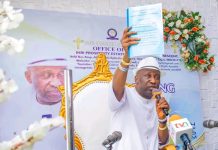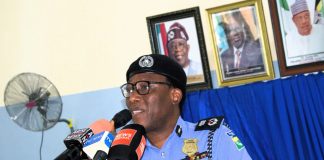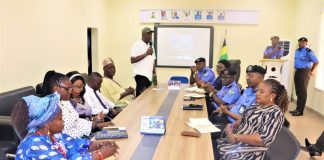… Launches Book “From City to Megacity”
Lagos State Governor, Babajide Olusola Sanwo-Olu, has commemorated His Royal Majesty, Oba Abdulwasiu Omogbolahan Lawal, CON, the Oniru of Iruland, on the occasion of his 55th birthday and the unveiling of his new book, From City to Megacity: A Memoir of Lagos Urbanization (1999–2023). The Governor described the book as a chronicle of strategic governance and visionary transformation.
Speaking through the Deputy Governor, Dr. Kadri Obafemi Hamzat, at the ceremony held at the Oriental Hotel, Victoria Island, Governor Sanwo-Olu noted that the event was not only a celebration of the monarch’s milestone but also an impactful legacy that reflects his unwavering commitment to the progress of Iruland and Lagos State.
His words, “That this launch coincides with the 55th birthday of its author, His Royal Majesty, makes today all the more profound not only because it commemorates his personal milestone, but because it is an impactful legacy that showcases His Majesty’s unwavering commitment to the progress of Iruland and Lagos State. From City to Megacity is not just a memoir; it is a chronicle of strategic governance and visionary transformation. It guides us through the rapid population growth, expansion of urban infrastructure, and the challenges of traffic, housing, and flooding. It reveals how bold reforms, policy innovation, and collaborative leadership turned obstacles into opportunities and laid the groundwork for a more inclusive and globally competitive city.”
The Governor further noted that the memoir’s emphasis on resilience, sustainability, and inclusiveness resonates strongly with the State’s vision for the future under the THEMES+ agenda, adding that the book will serve as a blueprint for urban scholars, students of governance, policymakers, and development professionals.
Speaking further, Sanwo-Olu stressed that the clarity, context, and lessons drawn from the book remind both citizens and government that meaningful progress is achieved through commitment, collaboration, and courageous leadership.
He, therefore, urged Nigrians, especially Lagosians, public servants, private sector stakeholders, academics, and development partners to view the book as a call to action, one that challenges everyone to safeguard Lagos’ progress, amplify shared values, and continue projecting the Lagos story as a model of possibility for Africa and beyond.
“I hope this book will inspire us to continue to honour our past, act with purpose in the present, and invest boldly in the future for a Lagos that is safe, vibrant, and full of promise,” the Governor concluded
In his address, former Minister of Works and Housing, Mr. Babatunde Raji Fashola (SAN), commended Oba Gbolahan for his commitment to preserving history and provoking meaningful dialogue, adding that the session underscored the need for strategic governance, institutional learning, and citizen-driven development to sustain progress.
Fashola noted that the Monarch, while serving as the Aides-de-Camp (ADC) to President Tinubu (then as Governor of Lagos State) sees the good, the bad, and the necessary lessons of governance,” urging the Nigerian Police and relevant authorities to harness their experiences for national development.
He was also of the view that the event also celebrated the release of a new book by the King which documents critical lessons from Lagos’s political and developmental journey between 1999 and 2023, emphasizing that the book explores Lagos’ evolution from an island and kingdom to a colony, a city-state, and now a mega-city-state while highlighting the continuous challenges of urbanization, population growth, and resource demands.
Fashola also drew parallels between the book’s insights and Lagos’ current socio-economic realities, including food security, housing, and infrastructure pressures in Nigeria’s most densely populated state.
Also, in his address, Chairman, Folawiyo Group, Alh. Tijani Babatunde Folawiyo, called for greater focus on resilience, sustainability, and long-term planning to secure the future of Lagos.
Folawiyo noted that while roads, infrastructure, and other visible projects are important, the real challenge lies in creating a livable city that can withstand environmental pressures and serve future generations, highlighting water management, resource allocation, and urban resilience as top priorities.
He stated that Lagos’ development story is more than physical transformation; it reflects the need for sound governance, equitable economic contributions, and a balanced approach to revenue and social investment. He noted that Lagos has thrived on vision, tenacity, and collaboration over the years, and urged leaders and citizens alike to continue reforms that prepare the city for the next three decades.
“Lagos is not a coincidence; it is the result of deliberate planning and shared commitment. Documenting Lagos’ history and aspirations is key to understanding its past, shaping its present, and building a sustainable future as Nigeria’s true Centre of Excellence.
Also, in his Review, Prof. Taibat Lawanson noted that the book, “From City to Megacity: Memoirs of Urban Transformation,” offers a compelling reflection on Lagos’ evolution from an island to a megacity-state, exploring the challenges, paradoxes, and opportunities of rapid urbanization, stressing that book reflects on the city’s contested spaces, cultural diversity, and economic potential while questioning how cities can empower their most vulnerable residents with dignity.
Prof. Lawanson noted that the book spans 484 pages, and it combines autobiography with deep insights into public service, urban governance, and sustainable development. It highlights critical sectors such as housing, security, agriculture, transportation, and environment, while tracing Lagos’s growth from colonial times through military and civilian administrations to the present, emphasizing that urbanization is not just a demographic shift but the soul of a city’s ambition and growth.
According to him, “The author contextualizes Lagos’ trajectory alongside cities like Johannesburg, Bogota, Jakarta, and Mumbai, presenting lessons on urban planning, social inclusion, and the balance between government aspirations and citizens’ survival practices.” Lawanson, therefore, admonished policymakers, urban planners, and citizens to rethink Lagos’ future, its governance, planning, and inclusive development, while offering practical lessons for other emerging cities.















